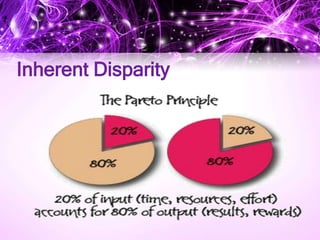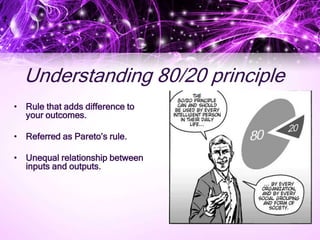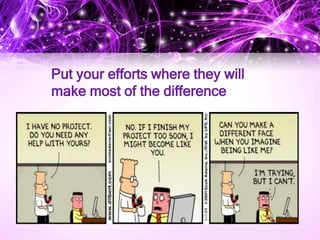Koch principle
- 2. 80/20 Principle : Richard Koch
- 3. Emergence of 80/20 Vital few & Trivial Many
- 5. Understanding 80/20 principle ŌĆó Rule that adds difference to your outcomes. ŌĆó Referred as ParetoŌĆÖs rule. ŌĆó Unequal relationship between inputs and outputs.
- 6. Put your efforts where they will make most of the difference
- 8. ’ā╝ 20% of the input creates 80% of the result ’ā╝ 20% of the customers create 80% of the revenue ’ā╝ 20% of the bugs cause 80% of the crashes ’ā╝ And on and onŌĆ”
- 12. 20% of your customers make 80% of profit
- 13. Need Analysis Target Training to critical content which can create larger impact on audience.
- 14. Social Media
- 15. Food Habits
- 16. Invest on Relationships ŌĆō VALUABLE
- 17. Productive - Web Surfing
- 20. INVESTMENTS
- 22. Dr.JASMEEN PAWAR
Editor's Notes
- In most of the endevours vital is few and trivial are many.Unequal distribution of wealth in his country.- 20% of people owed 80% of wealth in country.http://betterexplained.com/articles/understanding-the-pareto-principle-the-8020-rule/Pareto was so passionate about this that he observed that 80% of the land in Italy was owned by 20% of the people.┬Ā He further observed that 20% of pea pods in his garden contained 80% of the peas. ┬Ā
- There lies an inherent disparity between the inputs and the outcome achieved.
- http://thebiggandbusiness.com/articles/80-20-rule-applies-to-social-media-marketing-too80 per cent of your weekly blog traffic comes from 20 per cent of your annual readers80 per cent of your blog comments come from 20 per cent of your readers80 per cent of your Twitter interaction is with 20 per cent of your following80 per cent of your Facebook interactions come from 20 per cent of your fans80 per cent of what you publish on social media is dreck you want to say, 20 per cent is what the audience wants to hear
- Food┬ĀŌĆō Record your eating habits for a week. Calculate up the calories of the different items of food. IŌĆÖve done this before and IŌĆÖve found it surprising how some treats contribute a high percentage of your calorie pie for no nutritional value, when other vices consumed in smaller portions take up only a sliver but still offer a tasty treat.
- Web Surfing┬Ā- Record your web usage for a day or two. Write down the sites you visited or tools you used to get there (StumbleUpon, Digg, etc.) Figure out sites took up the most time and which had the least value. YouŌĆÖd be surprised how often they are the same thing.
- Goals┬Ā- It doesnŌĆÖt matter whether you have them written down or just in your head. Look at all your goals and compare the resources required to accomplish each (time, money, energy, etc.) with the benefits gained. Benefits could be physical rewards, purposeful work or emotional quality. Pursue the goals with the highest value.





















